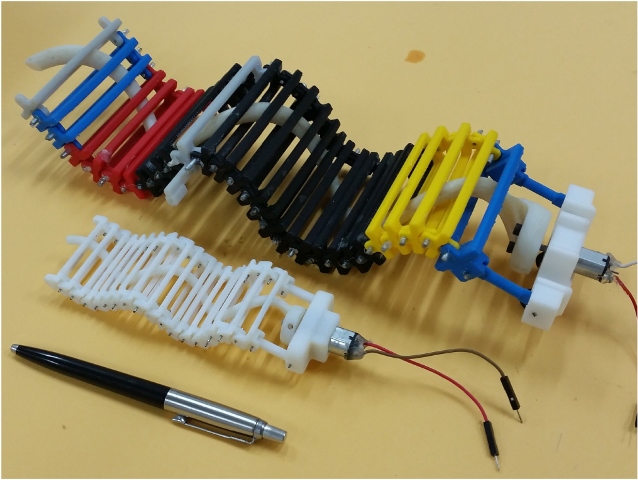The first SAW (Single Actuator Wave-like Robot) that produces a pure wave motion using a single motor has been developed at Ben-Gurion University of the Negev. The SAW robot is designed for medical applications, maintenance, search and rescue and security scenarios.

The unique robot was developed by Dr. David Zarrouk, a senior lecturer in the Mechanical Engineering Department and a member of the ABC Robotics Initiative. He is head of the Bio-inspired and Medical Robotics Lab.
He and two Masters students study the movement of the wave like robot: Ilanit Waksman, who researches swimming in viscous liquids, a movement that mimics small biological organisms; Nir Dagani, who researches movement on flexible and slippery surfaces in an effort to model the locomotion of robots within the human body.
The robot derives its inspiration from the way snakes move in nature, although its wave movement is perpendicular. The wave movement enables the robot to crawl across different surfaces, climb and swim, while the wheels are for steering. The robot’s top speed is 57 centimeters per second, five times faster than any similar robot. SAW can climb over obstacles or crawl through difficult surfaces like sand, grass and gravel. The robot can also climb through tunnels at a rate of 8 cm per second touching both sides. Moreover, a waterproof version can swim at 6 cm a second.
Dr. Zarrouk, “Despite the fact that researchers all over the world have been trying to create a wave movement for 90 years, we succeeded in finding a simple and unique solution that enables the robot to be built in different sizes for different purposes. For example, it can be scaled up for search and rescue and maintenance or miniaturized to a diameter of one cm or less to travel within the human body for medical purposes, such as imaging biopsies of the digestive system.”
He emphasizes that thanks to their new design, the robot is strong, easy to manufacture, reliable and energy efficient which enables long travel distances.
Moreover, he adds, “Throughout the testing we barely needed to perform any maintenance. The robot is ready to go and I believe that it has a very good chance of traveling through the intestine for imaging and biopsy purposes; the robot also has security potential primarily for use in infiltrating problematic and complex areas, such as tunnels, destroyed buildings, pipes and the like.”
Dr. Zarrouk is part of the ABC Robotics Initiative supported by the Leona M. and Harry B. Helmsley Charitable Trust.
The achievement was just published in Bioinspiration & Biomimetics, the leading journal in the field. The breakthrough was also written up in IEEE SPECTRUM.
